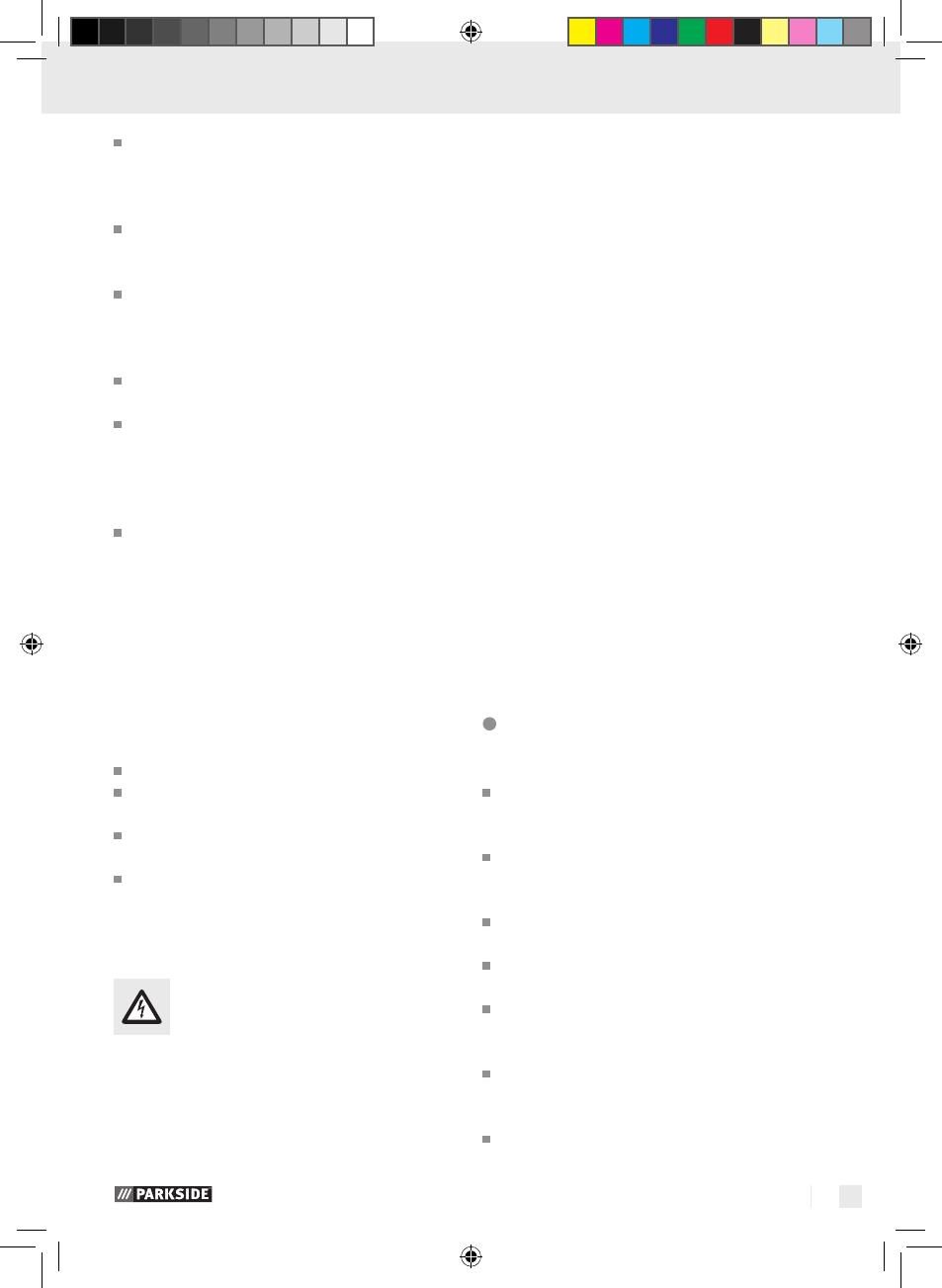Safety information, Safety notices specific to the welding shield – Parkside PESG 120 A1 User Manual
Page 41

41
GB/MT
Safety information
Safety information
Persons near the arc or assistants must also be
informed of the risks and outfitted with the nec-
essary protection. If necessary, set up protective
panels.
Ensure an adequate supply of fresh air whilst
welding, particularly in small spaces, as it pro-
duces smoke and harmful gasses.
Do not weld containers in which gasses, fuels,
mineral oils, etc. were stored - even if emptied
a long time ago - as residue poses an explosion
hazard.
Special regulations apply in rooms posing
fire- and explosion hazards.
Welded joints exposed to great strain and
needing to meet certain safety requirements must
be made by specially trained and certified
welders. Examples are pressure vessels, run-
ning rails, tow couplings, etc.
ATTENTION! Always connect the earth termi-
nal as close as possible to the point of weld to
provide the shortest possible path for the weld-
ing current from the electrode to the earth ter-
minal. Never connect the earth terminal to the
housing of the welding equipment!
Never connect the earth terminal to earthed
parts far away from the work piece, e.g. a
water pipe in another corner of the room. This
could otherwise damage the protective bond-
ing system of the room you are welding.
Do not use the welding equipment in the rain.
Do not use the welding equipment in a moist
environment.
Only place the welding equipment in a level
location.
The output is rated at an ambient temperature
of 20 °C. The welding time may be reduced in
higher temperatures.
Danger of electric shock:
Electric shock from a welding electrode
can be fatal. Do not weld in rain or snow.
Wear dry insulating gloves. Do not touch
the electrode with bare hands. Do not wear wet or
damaged gloves. Protect yourself from electric shock
by insulating from the work piece. Do not open the
equipment housing.
Danger due to welding smoke:
Inhaling welding smoke can jeopardize your health.
Keep your head out of the smoke. Use facilities in
open areas. Use ventilation to remove smoke.
Danger due to welding sparks:
Welding sparks can cause an explosion or fire.
Keep flammables away from the welding area. Do
not weld next to flammables. Welding sparks can
cause a fire. Keep a fire extinguisher nearby and
an observer ready to use it. Do not weld on top of
drums or any closed containers.
Danger due to arc rays:
Arc rays can damage the eyes and injure the skin.
Wear a hat and safety goggles. Wear hearing pro-
tection and a closed, high shirt collar. Wear welding
helmets and proper filter sizes. Wear full personal
protection.
Danger due to electromagnetic fields:
Welding current produces electromagnetic fields.
Do not use along with medical implants. Never wrap
the welding cables around the body. Consolidate
welding cables.
Safety notices specific to the
welding shield
Using a hot light source (e.g. lighter) always
check the welding shield is working properly
before starting to weld.
Welding splashes can damage the glass
shield. Replace damaged or scratched glass
shields immediately.
Promptly replace damaged or heavily soiled /
splashed components.
The equipment may only be operated by per-
sons who have turned 16.
Familiarise yourself with the safety instructions
for welding. Also refer to the safety instructions
of your welding equipment.
Always use the welding shield when welding.
Failure to use the shield may result in serious in-
juries to the retina.
Always wear protective clothing when welding.
55732_Elektro-Schweissgeraet_content_LB5.indd 41
21.11.13 14:52
